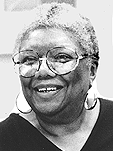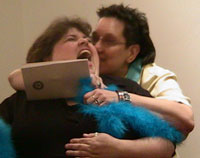Music in Our Mothers' House

Our unique celebration of motherhood and family
(Photo note at bottom of page)
May 9, 2003 | Unity Church, Enola
Dan Krynak, Artistic Director | Catharine Roth, Accompanist | Renee Bartholomew, Percussionist
Music In My Mother's House became our signature tune the very first time we performed it, at our first full-length concert “Autumn Fires” in October 1995. It evokes emotion in those of us who sang with our families as well as those whose families did not sing. When we gathered to envision a concert on this theme, we found a wealth of material from a wide variety of musical genres.
Program
Bim Bam
Jewish, from the Nigun tradition (Nigun are songs without words, with roots in the Hasidic movement, in which there is a saying,
“Silence is better than speech, but song is better than silence.”)
Published in Night Passage, from Libana
by Stuart Stott, arr. J. David Moore, pulished by J. David Moore
Mother’s Day Song
by Peter Jones, arr. C. Foty for the DC Area Feminist Chorus (now Bread and Roses Feminist Chorus)
We sing this in the spirit of Julia Ward Howe's vision of Mother's Day for Peace
Housekeeper’s Tragedy
North Carolina folk song, arr. Hermene Warlick Eichhorn
Hermene Warlick Eichhorn was born in Hickory, North Carolina in 1906 and became backup organist for her church at age thirteen. She attended Woman’s College (now the University of North Carolina at Greensboro) where she studied composition and earned bachelor’s degrees in piano and organ. In 1939, the thirty-voice women’s chorus of the Euterpe Club premiered her most intense choral work for women’s voices, “A Woman Plowing in the Field.” Housekeeper’s Tragedy was first published in 1945 and in 1995 was revived by the Treble Clef Music Press, from whom we get some of our best pieces.
Liebst Du um Schoenheit
by Clara Schumann, text by Rueckert, arr. Naomi Stephan
Published by Barton Rhodes Press, available from Yelton Rhodes Music
Soloist: Liv M.
Clara Schumann was the premier female musician of the nineteenth century. An accomplished composer and virtuoso pianist, she was born in 1819 and died in 1896. She was married to the composer Robert Schumann. While six months pregnant with their first child, Marie, she wrote twelve songs, including Liebst du Um Schonheit. As the text for all of these songs Clara chose poems of devotion and passion uniquely from a woman's perspective. Robert secretly had the 12 songs printed in two volumes and presented them to Clara on their first anniversary.
My Girls, No. 2 (from To My Girls)
Based on a poem by Lucille Clifton, music by Gwyneth Walker, published by Treble Clef Music Press

Lucille Clifton was born in 1936 and educated at Howard University and the State University of New York at Fredonia. Formerly the Poet Laureate of the State of Maryland, she has taught at Goucher College and the American University in Washington, DC. She has written ten collections of poems, 19 children's books and won an Emmy Award as the co-writer of Free to Be... You and Me in 1973. Gwyneth Walker’s song collection “My Girls”, based on some of Clifton’s poetry, was commissioned by Miss Porter’s School in Farmington, Massachusetts. In My Girls No. 2 we hear a mother celebrating and advising her four teenage daughters as they prepare to step into adulthood, their “forty quick fingers reaching for the door.”
The piece’s composer, Dr. Gwyneth Walker (b. 1947) , is a graduate of Brown University and the Hartt School of Music. She holds B.A., M.M. and D.M.A. Degrees in Music Composition. A former faculty member of the Oberlin College Conservatory, she resigned from academic employment in 1982 in order to pursue a career as a full-time composer. She now lives on a dairy farm in Braintree, Vermont. She has written some of the most beautiful and challenging arrangements we have performed.
Coat of Many Colors
Dolly Parton, arr. J. David Moore, pulished by J. David Moore
Everything Possible
Words and music by Fred Small, arr. J. David Moore, pulished by J. David Moore
Ensemble: Giesala C., Julie L., Linda M., Joanne N., Kate W.
1000 Grandmothers
Holly Near, arr. J. David Moore, pulished by J. David Moore
Special thanks to all the singers and board for contributing family photos for our matrifocal slide show
— Intermission —
Songs from Letters
(Two Movements: A Working Woman, and All I Have)
by Libby Larsen, based on letters from Calamity Jane to her daughter
Giesala C., soloist
Calamity Jane was married to Wild Bill Hickok. When they had a daughter, Janey, she sent to her live with a “normal daddy” and earned money for Janey’s support by working as a gambler, trick shooter, cowhand, barmaid, stagecoach driver, and prostitute. The poignant (indeed, bitter) text of some of her many letters to her daughter has been set to music by Libby Larsen as the song cycle Songs from Letters. Larsen, born in 1950, is one of America's most prolific and most performed living composers. She has created a catalogue of over 200 works spanning virtually every genre from intimate vocal and chamber music to massive orchestral and choral scores. Her music has been praised for its dynamic, deeply inspired, and vigorous contemporary American spirit.
Are You Half the Man Your Mother Thought You’d Be?
Words by Harry DeCosta
music by Leo Wood (1916), arr. Charles Baker, published by Yelton Rhodes Music
No Mirrors in My Nana’s House
Ysaye Maria Barnwell
Ginnie D., Kim H., Cathy N., Joanne N., Catharine R. Amy S., Beth S., Shirley T.
23d Psalm
by Bobby McFerrin (dedicated to his mother), arr. and pulished by J. David Moore
L’ Amicizia
Faustina Hasse Hodges, published by Treble Clef Music Press
Faustina Hasse Hodges taught piano, organ, and singing at the Emma Willard Seminary in Troy, New York and wrote sacred songs and hymns, keyboard works, and light recital and parlor songs; many were published and she enjoyed a wide success. L’Amicizia is a delightful parlor duet first published in 1863. It celebrates the tenderness of true love, “gentler than the sigh that a mother would breathe in that blessed moment when she will kiss her baby." It is interesting to note that Ms. Hodges dedicated it "to Miss Mary L. Tyler, Norwich, Connecticut."
Dream a Little Dream of Me
Words by Gus Kahn, music by W. Schwandt and F. Andree, arr. Norman Luboff
Published by Walton Music Coporation
Amy S., bass guitar (Amy’s mother loves this song and sang it to Amy and her siblings when they were children)
A Small But Fateful Victory
Words by Franciso X. Alarcon, music by Roger Bourland, published by Yelton Rhodes Music
The Stove
Text by Ann Kilkelly, music by Zae Munn, published by earthsongs
A Chat with Your Mother
By Lou and Peter Berryman
Cathy N., Joanne N., Suzanne N., Susan S., Shirley T., Lucy T., Tiffany W.
With thanks to Yagottawanna
Sisters

Words and music by Irving Berlin, arr. Kirby Shaw, published by Irving Berlin Music, distributed by Hal Leonard
Dancers: Giesala C., Florence T., Lucy T., Tiffany W.
Choreography by Lee M. and Stacey F.
Lee is a much-missed member of the chorus, now singing with New Wave Singers of Baltimore. She is an occupational therapist and works with Stacey, who is a physical therapist.
Archive of printable publicity pieces.
The photo that became the illustration for our concert publicity was taken about 1916 at a cottage on the Conewago Creek The woman with the guitar is singer Kate W.'s grandmother, and the child at her knee is Kate's father.
Email Links:
Report problems with this site
Request info




